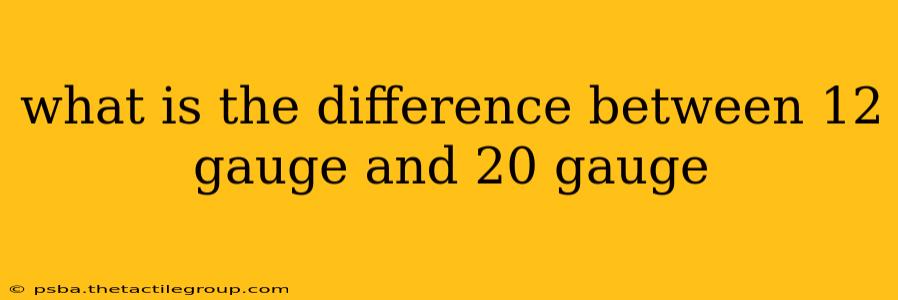Choosing between a 12-gauge and a 20-gauge shotgun depends heavily on your intended use. While both are popular choices for hunting, sport shooting, and home defense, they offer distinct advantages and disadvantages stemming from their fundamental difference: gauge refers to the diameter of the shotgun's barrel. Understanding this key distinction will help you make an informed decision.
Gauge Explained: A Matter of Diameter
The gauge system is a bit counterintuitive. A lower gauge number indicates a larger bore diameter. Therefore, a 12-gauge shotgun has a larger barrel diameter than a 20-gauge shotgun. This difference directly impacts several key performance characteristics.
Specifically, a 12-gauge shotgun's barrel is wider, allowing for larger shot charges and heavier payloads. Conversely, a 20-gauge shotgun has a narrower barrel, resulting in smaller shot charges and lighter payloads.
Key Differences Between 12 Gauge and 20 Gauge Shotguns:
1. Recoil:
- 12 Gauge: Generally produces significantly more recoil than a 20-gauge. This can be uncomfortable, especially for beginners or smaller shooters. The heavier recoil can also impact accuracy, particularly during rapid firing.
- 20 Gauge: Offers noticeably less recoil, making it a more manageable option for new shooters, women, and youth. Reduced recoil translates to better control and faster follow-up shots.
2. Power and Range:
- 12 Gauge: Delivers greater power and effective range due to its larger shot payload. This makes it ideal for hunting larger game at longer distances.
- 20 Gauge: While less powerful than a 12-gauge, a 20-gauge still packs a sufficient punch for many hunting applications, particularly smaller game at closer ranges. Modern ammunition advancements have significantly reduced the power gap between the two gauges.
3. Weight and Handling:
- 12 Gauge: Typically heavier than a 20-gauge shotgun, which can lead to fatigue during extended use. The heavier weight can also impact maneuverability, particularly in tight spaces.
- 20 Gauge: Lighter and more manageable, making it easier to carry and handle, especially during long hunting trips or tactical situations requiring quick movements.
4. Ammunition Availability and Cost:
- 12 Gauge: Offers the widest variety of ammunition types, including slugs, buckshot, and birdshot, and generally enjoys lower cost per round.
- 20 Gauge: While ammunition availability is good, it's not quite as extensive as 12-gauge, and the cost per round may be slightly higher in some cases.
5. Applications:
- 12 Gauge: Excellent for hunting large game (deer, turkey, waterfowl), home defense, and competitive shooting disciplines.
- 20 Gauge: Well-suited for hunting smaller game (squirrels, rabbits, doves), sporting clays, and as a lighter, more manageable option for home defense or general use.
Which Gauge is Right for You?
The best choice depends entirely on your needs and preferences:
-
Choose a 12-gauge if: You prioritize maximum power and range, hunt large game, or require the widest ammunition selection. Be prepared to handle significant recoil.
-
Choose a 20-gauge if: You want a lighter, more manageable firearm with less recoil, hunt smaller game, or prefer a less punishing shooting experience.
Ultimately, handling both gauges at a gun range or with the help of an experienced shooter is highly recommended before making a decision. Consider your physical capabilities, intended use, and budget to make the best choice for your individual circumstances.

